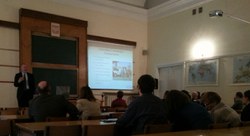
Penn State Extension’s traditional expertise extends into unique national and international shale energy arenas.
The Marcellus Shale:
The Marcellus shale is an expansive, organic-rich black shale formation that underlies much of Pennsylvania and surrounding states. Long known to be a source rock for conventional oil and gas production in the region, the Marcellus shale itself is now being explored as a natural gas producing reservoir. The Marcellus formation is estimated to hold 493 trillion cubic feet of extractable natural gas valued at more than $1.8 trillion.
Production of natural gas in the Marcellus has gone from 1.0 billion cubic feet per day (BCF/day) in 2008 to 2.0 billion BCF/day in 2010 to more than 12 BCF/day in 2013. The Marcellus shale alone accounts for 75 percent of America’s natural gas production growth since 2011.
While development is still in its infancy, natural gas production from Pennsylvania, specifically from the Marcellus, has already impacted national and international energy markets, displaced traditional areas of production and is putting pressure on natural gas prices world-wide. These impacts are likely to grow as pipeline infrastructure and natural gas export capacity continue to ramp-up to meet demand.
Pennsylvania is not alone in having significant shale reserves within its borders. There are a number of other states, provinces and nations that also have shale energy basins. The US Energy Information Agency recently estimated there are 95 shale basins throughout 41 countries that are prospective for commercial oil and gas production. At this point, the United States and Canada are the only nations producing commercially viable oil and natural gas from shale.
However, there are approximately a dozen other nations that are actively evaluating their resources, negotiating mineral concessions with the industry, developing environmental regulations and making public policy decisions on shale development. While going through this process, many of these nations are studying Pennsylvania in an effort to learn about the various opportunities and challenges related to shale energy.
Penn State Extension’s Marcellus Education Team:
Penn State Cooperative Extension’s Marcellus Education Team is a core group of faculty, Extension associates and county-based educators who are teaching about and researching the wide range of issues arising from shale natural gas and shale energy development.
With its connection to Penn State’s Marcellus Center for Outreach and Research (MCOR), the Marcellus Education Team has access to faculty from the colleges of Agricultural Sciences, Earth and Mineral Sciences, Engineering and other colleges across the University system.
Marcellus Shale and shale energy is a relatively new issue confronting Pennsylvania, but it affects much of what Extension’s traditional expertise addresses- land use, water quality and quantity, economic development, forest management, wildlife, family finances, public policy, and local government.
So even though shale energy is relatively new, Penn State Extension has the knowledge and expertise to help citizens, businesses, local leaders, communities, and others understand what it means for Pennsylvania, and how it may affect our environment, economy, communities, and citizens. Increasingly other University Extension Systems, governments and other stakeholders throughout the United States, Canada and around the world are coming to Penn State to learn about shale energy and to understand our research-based education and outreach programs focused on shale development.
To date, the extension has engaged 19 states, 24 countries, and seven of Canada’s provinces in shale related matters. Methods of outreach have included presentations, providing key stakeholder voices in meetings, publications, webinars, and community and site tours and visits.
Collaboration’s with universities, the Department of Community and Economic Development, Embassies, and Federal agencies such as the State Department and the Department of Interior has been a rewarding experience and is leading to new opportunities for Pennsylvanian’s. As Extension’s traditional role in educational outreach extends well beyond the Commonwealth’s borders, educators are able to bring back a variety of experiences and new knowledge to share with shale energy stakeholders in Pennsylvania.


